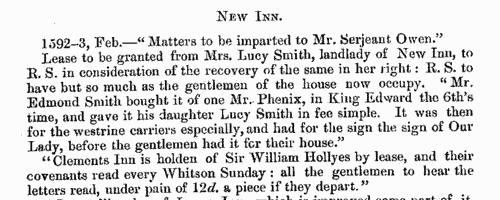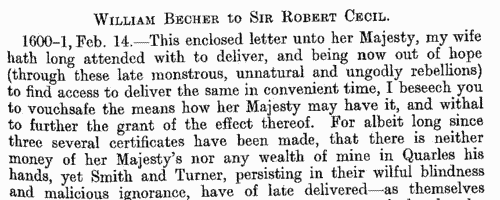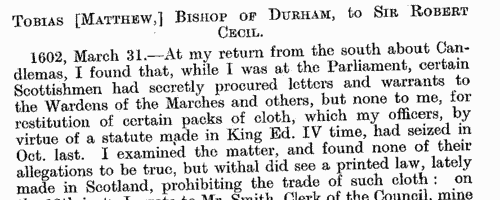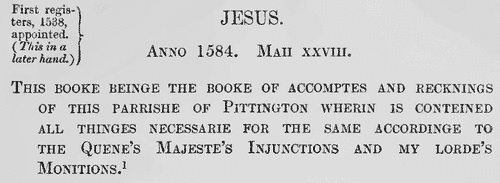Add this eBook to your basket to receive access to all 129 records. Our indexes include entries for the spelling moubray. In the period you have requested, we have the following 129 records (displaying 51 to 60): These sample scans are from the original record. You will get scans of the full pages or articles where the surname you searched for has been found. Your web browser may prevent the sample windows from opening; in this case please change your browser settings to allow pop-up windows from this site. Cecil Manuscripts
(1590-1594)
Letters and papers of William Cecil lord Burghley, Lord Treasurer of England. | Sample scan, click to enlarge

| Hastings family deeds
(1100-1600)
John Harley of the Historical Manuscripts Commission was invited by Reginald Rawdon Hastings to examine his family's extensive archives at the Manor House, Ashby de la Zouche, in Leicestershire. Harley produced a detailed calendar, of which is the first volume, published in 1928, Hastings himself having since died, and Harley having been killed at Gallipoli. This volume covers four categories of the records: the Ancient Deeds; Manorial and other Documents; Accounts and Inventories; and Miscellaneous Papers. Most, but not all, of the material is mediaeval. About half of the deeds relate to the family property in Leicestershire; then there are sections for Derbyshire, Nottinghamshire, Northamptonshire, Lincolnshire, Warwickshire, Staffordshire, Yorkshire, Northumberland, Norfolk, Cambridgeshire, Huntingdonshire, London, Wiltshire, Somersetshire, Devonshire, Buckinghamshire, Oxfordshire, &c. The manorial section includes a partitions of the estates of the Earls of Leicester and Wilton about 1204 and 1277; manor court rolls are mentioned, but not extracted. Choicer items from the family accounts and inventories are copied in extenso for 1596 and 1607, and thereafter summarised. Most of the later material is merely dipped into for curiosities. | Sample scan, click to enlarge

| Secretary of State's Papers
(1601)
The letters and papers of sir Robert Cecil, Secretary of State, deal with all manner of government business in England, Ireland and abroad. | Sample scan, click to enlarge

| Secretary of State's Papers
(1602)
The letters and papers of sir Robert Cecil, Secretary of State, deal with all manner of government business in England, Ireland and abroad. | Sample scan, click to enlarge

| Inhabitants of Pittington, county Durham (1618)
'The booke of accomptes and recknings of this parrishe of Pittington wherin is conteined all thinges necessarie for the same accordinge to the Quene's Majestie's Injunctions and my lorde[ the bishop of Durham]'s Monitions.' Refers mostly to parishioners, but occasionally to outsiders on parish business.
| Sample scan, click to enlarge

|  Apprentices registered at Edinburgh
(1715-1717) Apprentices registered at Edinburgh
(1715-1717)
Apprenticeship indentures and clerks' articles were subject to a 6d or 12d per pound stamp duty: the registers of the payments usually give the master's trade, address, and occupation, and the apprentice's father's name and address, as well as details of the date and length of the apprenticeship. There are central registers for collections of the stamp duty in London, as well as returns from collectors in the provinces. There was a single collection for the whole of Scotland, made in Edinburgh. The sums collected are recorded in Scottish money, with conversion to sterling for transfer to London. A Scottish pund was worth 20 English pence. Because of the delay before some collectors made their returns, this register includes indentures and articles from as early as 1714. (The sample entry shown on this scan is taken from a Norfolk return) | Sample scan, click to enlarge

| Treasury Books
(1717)
Records of the Treasury administration in Britain, America and the colonies, for 1717. These also include records of the appointment and replacement of customs officers such as tide waiters and surveyors. | Sample scan, click to enlarge

|  Apprentices registered at Edinburgh
(1720-1723) Apprentices registered at Edinburgh
(1720-1723)
Apprenticeship indentures and clerks' articles were subject to a 6d or 12d per pound stamp duty: the registers of the payments usually give the master's trade, address, and occupation, and the apprentice's father's name and address, as well as details of the date and length of the apprenticeship. There are central registers for collections of the stamp duty in London, as well as returns from collectors in the provinces. There was a single collection for the whole of Scotland, made in Edinburgh. The sums collected are recorded in Scottish money, with conversion to sterling for transfer to London. A Scottish pund was worth 20 English pence. Because of the delay before some collectors made their returns, this register includes indentures and articles from as early as 1719. (The sample entry shown on this scan is taken from a Norfolk return) | Sample scan, click to enlarge

|  Masters of Apprentices registered in Scotland
(1723-1726) Masters of Apprentices registered in Scotland
(1723-1726)
Apprenticeship indentures and clerks' articles were subject to a 6d or 12d per pound stamp duty: the registers of the payments usually give the master's trade, address, and occupation, and the apprentice's father's name and address, as well as details of the date and length of the apprenticeship. There are central registers for collections of the stamp duty in London, as well as returns from collectors in the provinces. There was a single collection for the whole of Scotland, made in Edinburgh. The sums collected are recorded in Scottish money, with conversion to sterling for transfer to London. A Scottish pund was worth 20 English pence. Because of the delay before some collectors made their returns, this register includes indentures and articles from as early as 1722. (The sample entry shown on this scan is taken from a Norfolk return) | Sample scan, click to enlarge

|  Masters of Apprentices registered in Scotland
(1741-1745) Masters of Apprentices registered in Scotland
(1741-1745)
Apprenticeship indentures and clerks' articles were subject to a 6d or 12d per pound stamp duty: the registers of the payments usually give the master's trade, address, and occupation, and the apprentice's father's name and address, as well as details of the date and length of the apprenticeship. There are central registers for collections of the stamp duty in London, as well as returns from collectors in the provinces and in Scotland. The sums collected are recorded in Scottish money, with conversion to sterling for transfer to London. A Scottish pund was worth 20 English pence. (The sample entry shown on this scan is taken from a Norfolk return) | Sample scan, click to enlarge

|
Research your ancestry, family history, genealogy and one-name study by direct access to original records and archives indexed by surname.
|












